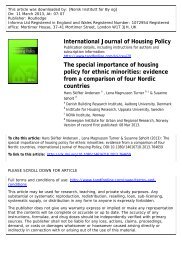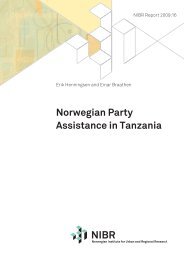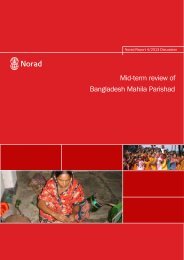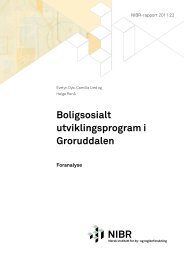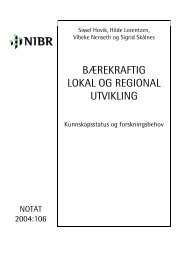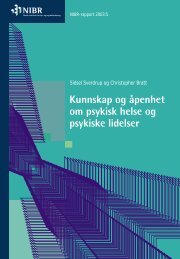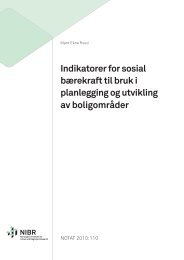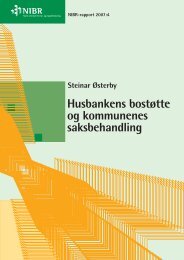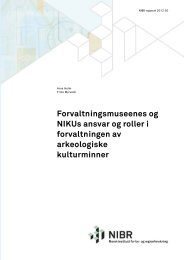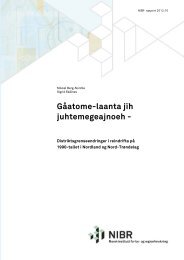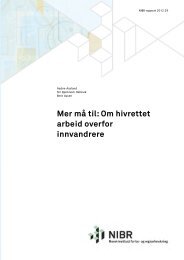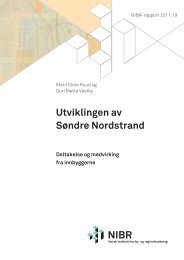Evaluation of the Southern and Eastern Africa Regional Centre for ...
Evaluation of the Southern and Eastern Africa Regional Centre for ...
Evaluation of the Southern and Eastern Africa Regional Centre for ...
- No tags were found...
You also want an ePaper? Increase the reach of your titles
YUMPU automatically turns print PDFs into web optimized ePapers that Google loves.
methodologically to visit women in prisons <strong>and</strong> to ask directly about <strong>the</strong>irexperiences including everything from <strong>the</strong> quality <strong>of</strong> <strong>the</strong> water to even <strong>the</strong> colours <strong>of</strong>uni<strong>for</strong>ms. This provided more underst<strong>and</strong>ing <strong>of</strong> holistic challenges women ‘on <strong>the</strong>ground’ encounter:‘After dealing with politically motivated violence <strong>for</strong> so long, I struggled. I was always attackinggovernment <strong>and</strong> saying it was a problem made by government. But with <strong>the</strong> course I came to seenuances. There are root causes, whe<strong>the</strong>r colonial l<strong>and</strong> patterns or climate change. I now have an eye<strong>for</strong> issues. 2 days ago I was at a community workshop with women receiving seeds. I could see thatwhile <strong>the</strong> seed was donated, it was wrong <strong>for</strong> that particular region. I saw o<strong>the</strong>r issues-like <strong>the</strong>y had nowater, <strong>and</strong> <strong>the</strong> hospital was far. I saw issues I learnt from <strong>the</strong> course. I now always think what is <strong>the</strong>nature <strong>of</strong> <strong>the</strong> problem <strong>for</strong> women, what are <strong>the</strong> legal, political <strong>and</strong> social issues? These women had notbeen consulted!’ Maureen Sib<strong>and</strong>a (Zimbabwean Lawyers <strong>for</strong> Human Rights).Employer ViewsSome employers’ views have already been mentioned in passing. However, anadditional number <strong>of</strong> employers made <strong>the</strong> following observations about graduatesunder <strong>the</strong>ir employment. First, a Women’s NGO noted how usually organisationsidentify issues <strong>and</strong> needs but that she (a graduate <strong>and</strong> employee) had graduates whonow managed to link issues to funding <strong>and</strong> to think through projectconceptualisation <strong>and</strong> to deal with sensitive issues. The issue was indeed sensitive asit dealt with politically motivated rape. Both a higher level analysis <strong>and</strong> also sensitivitywas directly attributable to <strong>the</strong> graduate in question. The same employer also notedhow ano<strong>the</strong>r employee was confident <strong>and</strong> sufficiently knowledgeable to engage onlegal issues following <strong>the</strong> Masters.The Director <strong>of</strong> an NGO dealing with legal aid <strong>and</strong> o<strong>the</strong>r associated issues notedhow one graduate in particular shows an ability to analyse <strong>and</strong> listen in regards tolegal aid advice, which in general tends to st<strong>and</strong> out from o<strong>the</strong>r employees.Ano<strong>the</strong>r organisation Director commented that: ‘<strong>the</strong>re is a huge difference reflectedbetween those writing reports <strong>and</strong> also at a personal level. A more confidentapproach is brought. For example, our advocacy <strong>of</strong>ficer [a graduate] supervises <strong>and</strong>packages policy briefs she learnt to do from <strong>the</strong> Masters <strong>and</strong> uses <strong>the</strong>se experiencesto engage with duty bearers’. Un<strong>for</strong>tunately, given <strong>the</strong> career mobility mentionedearlier in <strong>the</strong> report, <strong>the</strong>se same abilities are also losses to organisations should staffchoose to move on. Still, despite <strong>the</strong> loss to those particular organisations, <strong>the</strong>Director did none<strong>the</strong>less suggest that: ‘But <strong>the</strong>n at a higher level we have a pool <strong>of</strong>pr<strong>of</strong>essionals who can critically analyse issues <strong>and</strong> push <strong>the</strong> agenda. They move onbut tend to stay in <strong>the</strong> field’. These comments are supported by <strong>the</strong> survey thatshowed <strong>the</strong> majority stay working in <strong>the</strong> women <strong>and</strong> law ‘sector’ after graduation.In terms <strong>of</strong> influence it is noteworthy to record some additional impacts in <strong>the</strong>Zambian police <strong>for</strong>ce, especially as this is a key area <strong>for</strong> women. The Director <strong>of</strong>Human Resources has recently written a letter to <strong>the</strong> <strong>Centre</strong> which was shared with<strong>the</strong> evaluation team (Annex 6). He suggested that due to graduates changes are nowseen in <strong>the</strong> Zambian police <strong>for</strong>ce. Impact is through graduates work on gender basedviolence <strong>and</strong> also related to some <strong>of</strong> <strong>the</strong> graduates who are now in charge <strong>of</strong> variousgroups in leadership positions. This employer gave an example <strong>of</strong> a recent meetingon children trafficking <strong>and</strong> with <strong>the</strong> graduates contributing to this meeting <strong>and</strong> whoseinput he found ‘very important’. The police regard <strong>the</strong>se graduates as a resource35



